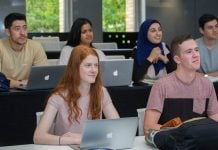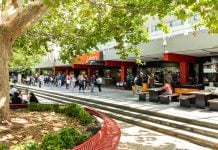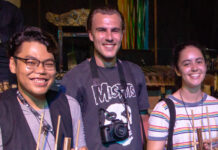Beth Radulski and Nyssa Jaworowski
Are you or someone you know interested in neurodiversity inclusion? Do you have at least one elective remaining in your course plan?
We are currently offering a range of placement opportunities and funding/bursaries for eligible students to contribute towards the Neurodiversity Project at La Trobe in 2024!
Situated within Health, Wellbeing and Inclusion, the Neurodiversity Project aims to improve equity, accessibility, and inclusion for Neurominority groups at La Trobe—including Autism, ADHD, Dyslexia, mental health conditions, cognitive disabilities, and beyond. The Project oversees a range of evidence-based initiatives to support this, including peer support, social opportunities, career networking opportunities and more.
What is the Neurodiversity Placements Program?
Recently featured in the Age, having won the 2023 Vice Chancellor’s Award for Innovation, this placement opportunity equips students with the theory and skills to implement neurodiversity best-practice principles into educational and professional settings, while gaining CV experience and a subject credit towards their degree!
To undertake a neurodiversity industry placement, students will be required to enrol in a 15 credit point elective subject that has a hurdle requirement of 100 hours of placement.
In some cases, once students complete their Neurodiversity Project Placement as an elective subject, they may opt to complete the Industry Placements Minor where they will undertake an additional 300 hours of placement; students who decide to complete this minor can be matched with an industry partner who is interested in Neurodiversity.
What do Placement Students do, and why is this Important?
Neurominority groups can bring many strengths into classrooms and workplaces. However, they have unemployment rates 30-40% higher than the general population. Often, this is due to a combination of stigma, discrimination, and a mismatch between an individual’s access needs, and the physical and social environment in question. To resolve these issues, schools, workplaces, and their employees need to be educated on how to support Neurominorities. Then, they need to use this knowledge to change from within.
Our Neurodiversity Placement students are learning how to support these changes by:
- Making cultural and physical environments more Neurodiversity inclusive
- Identifying and addressing Neurotypical privilege
- Locating key anti-discrimination policies for Disability on national and state levels
- Facilitating social inclusion without the expectation of masking and camouflaging (acting Neurotypical)
- Working on a diverse and interdisciplinary team: our placement students can come from several Neurodiversity related backgrounds, including Psychology, Social Sciences, Business, Neuroscience, and beyond!
- Ensuring that the Impact is Real by translating the latest research in this area into Neurodiversity inclusion recommendations for educational and industry settings
Placement students will assist in making La Trobe more Neurodiversity inclusive under the guidance of a Neurominority supervisor and Neurodiversity researcher. They will be the first generation to enter the workforce with the skills, expertise, and experience needed to make society more Neurodiversity inclusive!
Here’s what two of our current placement students have to say:
What interested you about becoming a placement student?
Jamie Collins: I have experienced anxiety and depression throughout my university life and understand the pressures that come with it. I want to help the next generation of university students to better understand the resources available to help them through this stage in their lives and meet their full academic potential.
Erin Salmon: This placement gives me the opportunity to learn how I can advocate for and support my fellow Neurominority individuals in workplaces. By completing this placement, I hope to grow as an individual and a future psychologist, with the hope I can provide the best support to my clients.
Why do you think it’s important to increase access to employment for under-represented groups?
Erin Salmon: Everybody that has the skills should have the right to be employed… Employers should make allowances for staff that need additional resources to make the workplace a safe and rewarding experience.
What are some examples of Neurodiversity-friendly inclusion practices?
Erin Salmon: Yellow Ladybugs [the Autism organization] has a sensory safe space… Next Level Collaboration has headphones that cover the ears for noise, and [use] whiteboards to communicate [when speaking is not possible]… [or] signs which allow breaks or time outs… These allowances don’t need to be costly as they may just involve a quiet place where someone can have a time-out, encouraging fidgeting [toys] and/or listening to music.
How do you feel about Neurodiversity Inclusion in the workplace?
Jamie Collins: I think it’s very important as nobody should be excluded because of their disability.
Erin Salmon: Neurodiversity in the workplace encourages inclusiveness and allows workplace access to a diverse range of thinking… It also encourages understanding and acceptance which inspires a more welcoming and supportive environment for everyone.
Interested in learning more?
Organisations interested in Neurodiversity, and/or hosting placement students in this area, should contact Beth Radulski at Neurodiversity@latrobe.edu.au.
Students interested in the Neurodiversity Placements Program should contact Neurodiversity.Hub@latrobe.edu.au
In the meantime, check out our partner Neurodiversity Hub for some great resources, tips and tricks and supporting Neurodiversity at school and work.
*Jamie Collins is a pseudonym used to protect the student’s privacy













